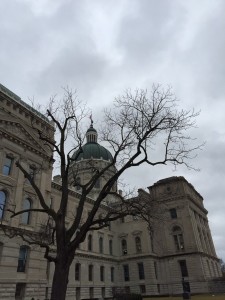by Jeff Stant, IFA Executive Director
Senator Brent Steele (R-Bedford) authored an amendment that would have resurrected Senate Bill 365 coauthored by four Republicans and one Democrat which would have protected 10% of state forest land from logging. The bill was killed in caucus by Senator Brandt Hershman (R-Monticello), majority floor leader because it was deemed to have a “fiscal impact.”
The bill appeared to have enough votes to pass. We were heartened so many Republican senators saw the value in protecting this fraction of taxpayer-owned land for wilderness recreation and deep forest wildlife habitat.
But we are equally appalled by the Indiana Department of Natural Resources claim to the Senate that the reason not to enact this reasonable measure of conservation is that “the state would lose nearly $52 million dollars in lost timber value and $467,000 in the next harvest cycle, if they couldn’t cut these forests down.” With this, the DNR admits that logging is a priority above all else.
In fact, the DNR had already committed to set aside 10 % of the state forests from logging in its Strategic Plan for 2015-2019. To gain a seal of approval for practicing sustainable forestry, the DNR had also agreed in audits by the nationally-based Forest Stewardship Council in 2011, 2013, and 2015 to set aside 10 % of the state forests from logging.
To assert the bill would have cost the state this lost timber value was a fraud; the state had already committed to incurring the costs. Also, the asserted fiscal cost overlooked the cost to log these forests at this scale, and inferred that DNR believes it is acceptable to treat our state forests as agriculture, rendering these public forests unusable by hikers, and decimating habitats of native species.
The Indiana Forest Alliance will continue to mobilize citizens to demand that Governor Mike Pence stop the unprecedented level of logging in our state forests and stop pressuring the DNR’s Division of Forestry to fund itself with logging revenue. Take action by spreading our petition. The forests need our advocacy more than ever.

